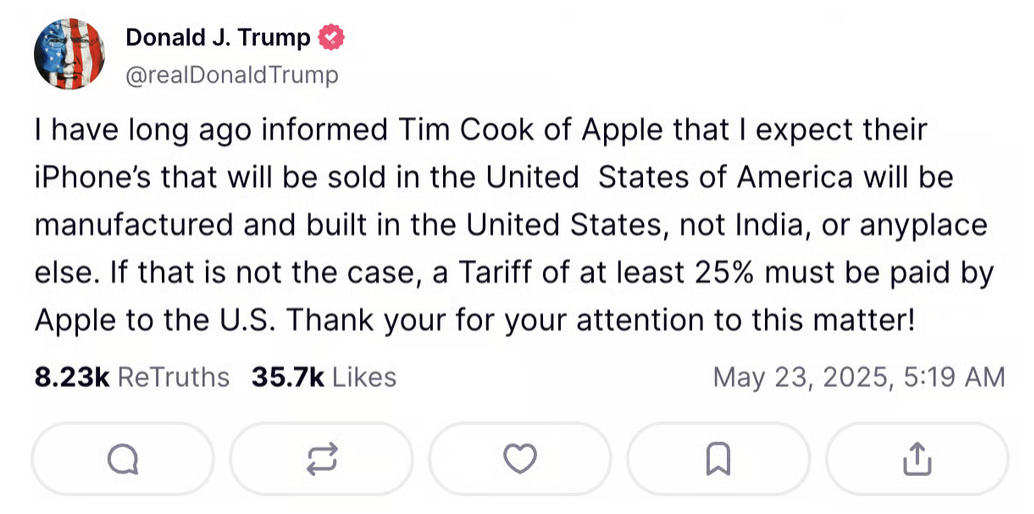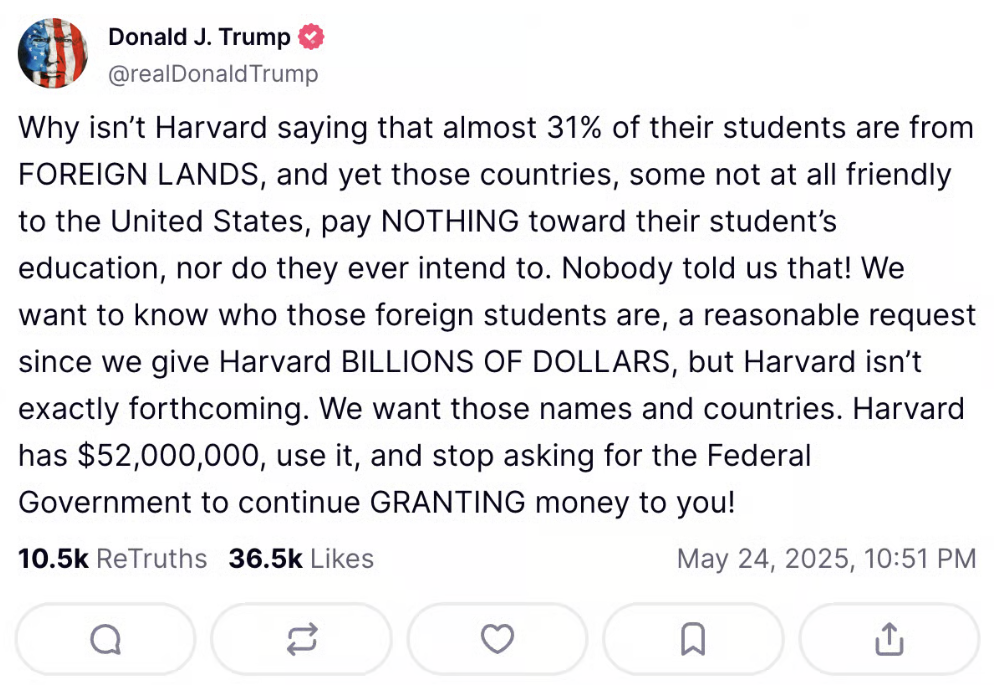Harvard, Apple, and the EU
What has President Trump said this week?
〰️
What has President Trump said this week? 〰️
1. New Tariff Targets: the EU and Apple
On Friday, May 23, President Donald Trump escalated trade tensions by threatening a 50% tariff on all European Union imports and a 25% tariff on foreign-manufactured smartphones, with Apple as main target. The tariffs were initially set to take effect in June (CNN, 2025).
Trump justified the move by claiming EU trade talks were “going nowhere” and accusing the bloc of taking advantage of the U.S. with what he described as a $250 billion trade deficit. Official figures from the U.S. Commerce Department place the trade imbalance closer to $236 billion as of 2024 (CNN, 2025). After the EU extended an offer to resume negotiations, the White House reported progress in U.S.-EU trade talks, which contributed to a market rally: the S&P 500 rose 2%, the Dow Jones gained 1.7%, and the Nasdaq climbed 2.4%. In response, the administration postponed the tariff deadline to July 9 (The Guardian, 2025).
Regarding Apple, President Trump warned that unless Apple moves iPhone production to the United States, tariffs would be imposed, stating, “No tariff if you make it in the U.S.” The warning comes after Apple CEO Tim Cook announced a partial shift in production from China to India to reduce the company’s exposure to existing tariffs. Apple estimated that these tariffs could increase costs by $900 million this quarter (International Business Times, 2025). Following the announcement, Apple shares fell over 3%, wiping out approximately 70 billion in market value as investors reacted to concerns over supply chain disruptions and potential price increases. Industry analysts now estimate that a U.S.-manufactured iPhone could cost as much as $3,500, compared to the current average of $1,200. Despite Apple’s previous pledge to invest $500 billion in the U.S. and create 20,000 domestic jobs, the viability of these commitments is now being questioned.
2. Trump vs Harvard
President Trump intensified criticism of Harvard University after a federal judge blocked his administration’s effort to revoke the school’s ability to enroll international students. The proposed policy would have impacted the visa status of nearly 7,000 foreign students at Harvard. The administration has accused the university of leveraging its elite status and international ties in ways that are not aligned with U.S. interests, with Trump claiming that a significant share of students come from countries that are "not at all friendly to the United States."
Earlier in April, the administration launched a review of nearly $9 billion in federal grants and contracts awarded to Harvard, citing concerns over alleged antisemitism on campus and the silence of conservative viewpoints. Federal officials requested that Harvard amend its admissions policies, dismantle its DEI programs, and comply with other federal guidelines (Reuters, 2025). When the university declined, the administration directed agencies to review approximately $100 million in federal contracts for possible cancellation or reallocation, which ultimately led to a $2.65 billion freeze in federal funds (BBC, 2025).
Harvard has responded by filing legal challenges contesting both the funding freeze and the restriction on enrolling international students. The situation has sparked a national debate over academic autonomy, federal oversight, and the broader implications for international education. With over 1 million foreign students currently studying in the U.S., the outcome of this dispute could have significant global ripple effects.
3. Trump: Putin’s gone CRAZY
On Sunday, President Donald Trump described Russian President Vladimir Putin as “absolutely CRAZY” and accused him of “needlessly killing a lot of people,” following recent missile and drone attacks on Ukraine. Despite the strong language, the Trump administration has recently blocked renewed aid to Ukraine and signaled a possible step back from active mediation efforts (NPR, 2025). The Kremlin responded by dismissing Trump’s remarks as an “emotional overload,”highlighting what it sees as a disconnect between rhetoric and policy (BBC, 2025).
Meanwhile, U.S. lawmakers are moving forward with a proposed sanctions bill that would ban financial transactions with Russian entities and impose a 500% tariff on countries trading Russian energy—including oil, gas, uranium, and petrochemicals—should Moscow refuse to engage in peace negotiations (Euro News, 2025). The bill represents a shift toward tougher consequences, signaling that sanctions remain a central component of U.S. strategy. While intended to increase pressure on Russia, the EU has expressed concerns that the measure could pose risks to transatlantic economic and political coordination.




